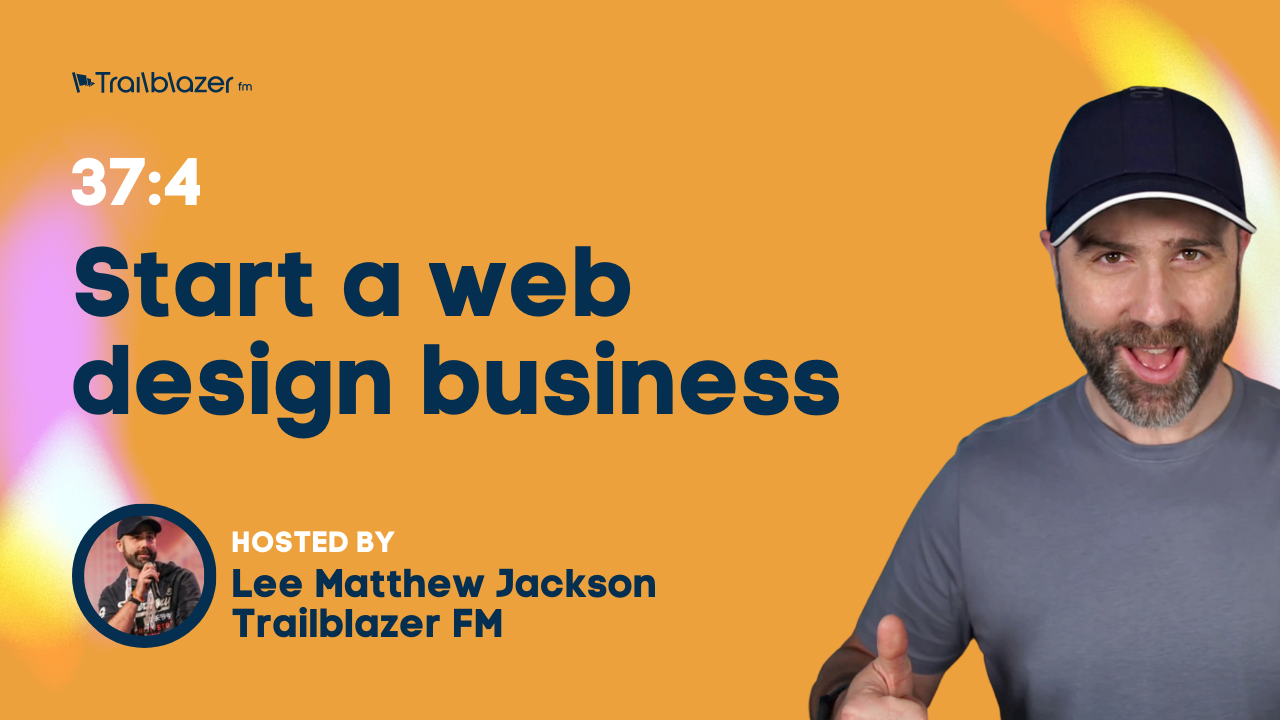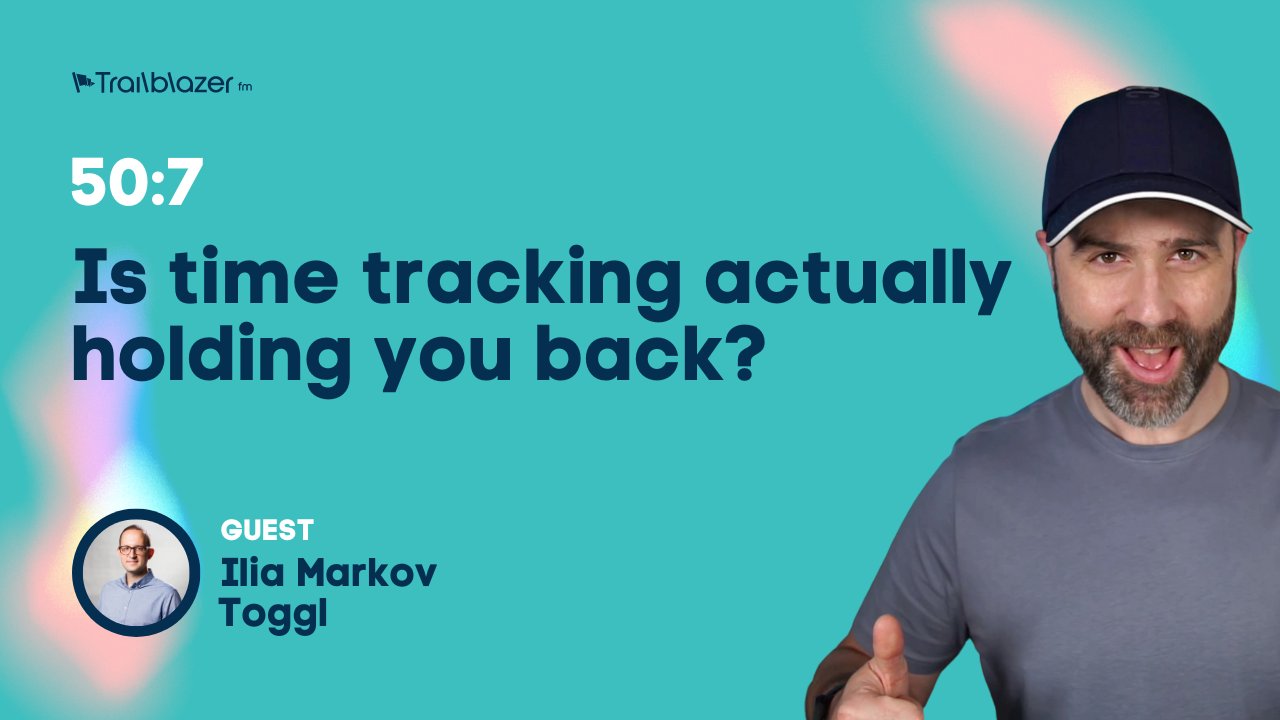
37:4 How to start a web design business
You might be doing it all wrong! Hear me out. Did your design hobby become a business because people started offering you money for your services? This is how many web design agencies were born, including my own and that is where the problem begins.
You might be doing it all wrong! Hear me out. Did your design hobby become a business because people started offering you money for your services? This is how many web design agencies were born, including my own and that is where the problem begins.

Most businesses launched from a hobby struggle with a lack of direction, they battle with cash flow, their founders may be exhausted and their team disillusioned.
There is a right way to launch a web design business and it’s not too late to make some real positive change even if your business is several years old.
In this episode I will share with you some essentials for starting right. Set up your web design business for success with firm a foundation and with a clear strategy
The startup checklist
- Give your business a name
- Establish your product / service offering
- Create your customer avatars
- Research your target market
- What answers are they looking for
- What are their key problems
- Where do they show up
- How do they acquire services
- Decide on your marketing channels
- Document the basics
- Business plan
- Marketing plan
- Pricing model
- Financial plan
- Get to action
- Test and iterate
Resources
- How to transform your agency
- How to work out your hourly rate
- The one-page business plan
- Marketing activities or agencies
- Managing your personal finances
- Managing your agency finances
Transcript
Welcome to the Agency Trailblazer Podcast. This is your host Lee and today we look at the web design business startup checklist, whether you own an agency that is several years old or whether you are starting out. I highly recommend you stay tuned as we work through the essentials that your business needs to succeed.
Before we carry on, I’d like to thank our wonderful sponsors that’s Cloudways. They are my cloud hosting platform of choice. You can check them out over on cloudways.com. Thank you so much Cloudways for believing in our mission.
Now, starting a business is hard and many people in our industry started their business by accident. Let me explain that a little bit. If we go back in time and remember when we first got into design or into development and started building websites as a hobby, that was something that we really enjoyed doing. That was a passion that we naturally created from the curiosity and our creativity.
I imagine then at some point somebody needed some help and you were able to build them a website or design them a logo, essentially to create something using the skills that you had developed from your passions. At some point you will have decided to start charging and behold your business has been born and this is such an exciting time. You are being paid to do what you love. Over time, you’ve attracted customers and grown your business. Perhaps you have added staff, perhaps you have a physical office location and this is all wonderful and it’s all exciting.
But for many people who start their business in such a way, they come to a point where they are struggling. They may be struggling to grow their business, may be struggling with feast or famine. Perhaps they are getting tired and jaded of what they have built. In my own experience, this is because there is no clear direction for the business. The business wasn’t launched on purpose. The business was built as a reaction to events, to conversations and opportunities that were happening at the time. And over the years, the agency that has been established is a sum of all of those disparate parts.
I share this from my own experience, where we had an agency that did all things for all people. We established ourselves as a full service agency offering any service that we could possibly sell. It was really hard to differentiate ourselves. It was really hard to market ourselves. It was really hard to grow our business. And during the recession that happened in 2007, 2008 and 2009, it was really difficult to push on through, survive and thrive.
I’ve learned the hard way that there is a right way to launch your business. And I’d like to share with you a startup checklist that highlights some of the most important areas that you need to get right when starting your agency. I would encourage you if you have already got an agency, it is not too late to revisit any of these. So stay tuned and let’s work our way through the startup checklist.
This list assumes you are starting a new web design business from scratch. But remember, you can still go back and do any of these you feel are missing if you already have an established business. The first is to give your business a name. In my experience, the name is far less important than the conversations that you are having. So any name will do to get started. Full disclosure, my business has gone through several naming iterations and rebranding as I have evolved my agency that really highlights that. It’s not that important what you call your business. It’s more important how you structure it.
Now you’ve written down a name for your business. You want to establish your products or services, and this should be those things that you are really freaking amazing at. I shared that my agency many years ago tried to offer as many services as possible because we felt that that would be our competitive advantage. Unfortunately, we became a business that did many things satisfactorily as opposed to a company that did a few things, amazingly. Having a small range of products or services that play to your strengths will help to build your confidence and help you establish a clear marketing message.
You will understand what problems your product or service solves. And you can build your customer avatar so you know who to approach with that product or service. This perfectly segway to those customer avatars, who are the people who will benefit the most from the product or service that you have to offer? There will be an industry, there will be a type of company or person who will benefit most from your product or your services. That’s usually because the problem that they have is an expensive problem. It’s something that they lack the power to solve and need you to come in and solve it for them.
Now we’ve established our customer avatars. It’s important to research our target market in order for us to build a compelling marketing strategy. We need to understand what answers they are looking for. What is it that they need answers to? What are the key problems that your target market are trying to solve? Take a look and see. Where do they show up? Where do they show up online and where do they show up physically, for example, at specific events? How do they acquire services? Where do they go to seek suppliers, for example, in Event Engine we understand that our target market are looking to attract high value sponsors and exhibitors and increase footfall at their events. They will acquire their services through a tender or pitch process or through relationships built over the years with either staff movement or with networking.
Armed with that market research, we can decide next on our marketing channels. To use my agency Event Engine as an example, we recognize the importance of being at specific events by networking, by building relationships with key people in key businesses that we want to target and engaging in paid campaigns in industry magazines. We understand our target market. We understand their key problems. We can speak in their language. We understand where they show up. We understand how they acquire their services. Therefore, we need to show up in the right places. Thus we need to select the right marketing channels. For us to engage in a pay per click campaign would be a waste of our time and energies when the people that we wish to target are showing up in a completely different space and are acquiring the services they need in a completely different way.
One of the reasons businesses fail is for lack of documentation. It’s really important we document the basics. We’ve done a lot of research here. We’ve established our product and our service. We’ve established our customer avatars. We’ve done the market research. We’ve decided on our marketing channels and it’s now time for us to start documenting the plan. For many people, the word business plan conjures up images of a huge, complicated document that is essentially impossible to create. And yet we as a business operate on a one page business plan.
You can check that out over on episode number 249 titled The One Page Business Plan. I’m one of those people who cannot cope with pages and pages of content. I can’t sit and look at a massive document and fill it in and read it and consume it and understand it. I need a really clear basic framework that my brain can comprehend. So if you’re like me, this will certainly be something that will help you. That’s episode number 249, the one page business plan.
As part of your business plan, you can establish what you will be doing with your marketing. That is the activities that you will be engaging with to move forward, to establish your name in the industry, to attract leads and to convert those leads. In episode number 223, I share a range of marketing activities for agencies that you can engage with.
Next establish your pricing model and get that documented. Unfortunately, many agencies become unstuck because they do not charge enough. They struggle with profitability. In episode number 215, I help you understand how to calculate your hourly rate and you can use that to build up packages for your products or services. Also, if you want to learn more about value based pricing, then episode number 235 featuring Robert DaCosta is where we unpack value based pricing to really help you understand that concept.
And finally establish your financial plan, in episode number 255, I share how you can manage your agency finances. And in episode number 261, I also share how you manage your personal finances. I remember learning the hard way that my personal decisions with my own finances can inadvertently affect my own agency. That’s episode number 261.
As a recap, we’ve given our business a name. We’ve established those products and those services. We’ve created the customer avatars. We’ve done our market research based on those avatars so we can understand the answers that they are looking for, the key problems that they have, where they are showing up, how they acquire services and so on.
Based on that information, we have then decided on our marketing channels. And based on all of this research, we have documented the basics. That means we’ve built a business plan, our marketing plan or strategy. We developed our pricing model. We understand our financial planning. So with all of that, we are ready to take action to test and to iterate. You are not going to get it right first time. Therefore, it’s important, armed with these basics, that you go out there and find out what works and find out what doesn’t.
You will find this checklist in the show notes. I would encourage you whether you are starting out for the very first time or if you are looking at improving your existing business to go through each and every one of these steps to ensure that your business is built on a firm foundation.
As you launch or grow your agency, you can get support in our community. Check it out over on trailblazer.fm/group and join thousands of agencies from all around the world as we support each other, ask questions and share funny gifs. That’s trailblazer.fm/group.
Folks, if we don’t see you in the group, then let’s see you in next week’s episode.








